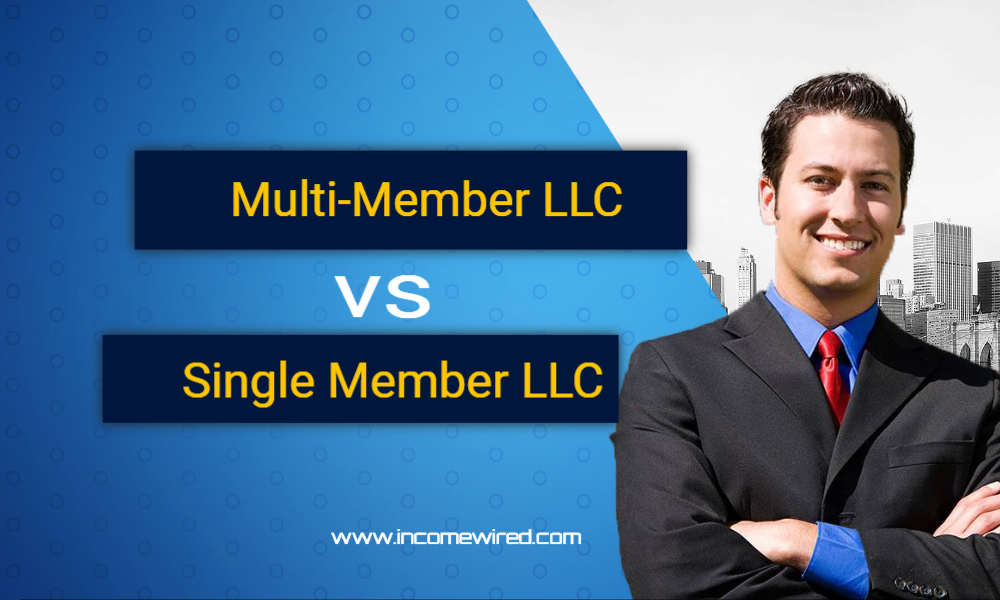we help service-based business owners, freelancers, and aspiring businesses with our content & services & When readers purchase services discussed on our site, we often earn affiliate commissions that support our work. Find out more about Income Wired
Starting your own business is a big undertaking, and there are many important decisions you will need to make along the way. One of the most important decisions you will need to make is what type of business entity to establish. There are several different types of business entities, each with its own advantages and disadvantages. Limited liability companies (LLCs) are a popular choice for small businesses because they offer personal asset protection and flexible taxation options.
What is an LLC?
A Limited Liability Company (LLC) is a business structure that offers limited liability protection to its owners. Limited liability means that the owners are not personally liable for the debts and liabilities of the LLC. This type of company is popular among small business owners and entrepreneurs who want to limit their personal liability.
An LLC can be either member-managed or manager-managed. In a member-managed LLC, the members (owners) make all the decisions and run the day-to-day operations of the business. In a manager-managed LLC, there is a designated manager (or managers) who make the decisions and run the day-to-day operations on behalf of the members.
What is the purpose of an LLC?
The purpose of an LLC is to provide limited liability protection to its owners. Limited liability means that the owners are not personally liable for the debts and liabilities of the LLC. This type of company is popular among small business owners and entrepreneurs who want to limit their personal liability.
How are LLCs Formed?
LLCs are formed by filing Articles of Organization with the Secretary of State in the state where the LLC will be doing business. The Articles of Organization must include the name of the LLC, the LLC’s purpose, the names and addresses of the members, and the name and address of the LLC’s registered agent.
What is an LLC Operating Agreement?
An LLC Operating Agreement is a document that outlines the ownership and operating procedures of an LLC. The Operating Agreement is not required in all states, but it is a good idea to have one even if it is not legally required. The Operating Agreement can help prevent disputes among the members and set forth the rules for running the LLC.
What is an LLC registered agent?
A registered agent is a person or company that agrees to receive legal documents on behalf of the LLC. The registered agent must have a physical address in the state where the LLC is formed and must be available during normal business hours. The registered agent can be either an individual or a company.
Taxes
LLCs can be taxed as either sole proprietorships, partnerships, or corporations. The way an LLC is taxed depends on how many members it has and how it is structured. Most LLCs are taxed as sole proprietorships or partnerships.
Creating an LLC Opens Up Many Tax Advantages
LLCs offer many tax advantages for small businesses. For example, LLCs can choose to be taxed as either a sole proprietorship, partnership, or corporation. This flexibility allows LLCs to tailor their tax status to their specific needs. Additionally, LLCs are not subject to the double taxation that corporations are subject to. This means that the LLC’s owners only pay taxes on their personal income, not on the LLC’s income.
Limited Liability Companies Offer Personal Asset Protection
Another advantage of LLCs is that they offer personal asset protection to their owners. This means that if the LLC is sued or incurs debts, the members’ personal assets are protected from seizure. This type of protection
Limited Liability Company Benefit
LLCs offer several important benefits to small business owners, including personal asset protection and flexible taxation options.
Personal Asset Protection: One of the main advantages of an LLC is that it offers personal asset protection to its owners. This means that the members’ personal assets (such as their homes, cars, and bank accounts) are protected from creditors if the LLC owes money. Only the assets of the LLC are at risk.
Flexible Taxation Options: LLCs also have flexible taxation options. LLCs can choose to be taxed as a sole proprietorship, partnership, C corporation, or S corporation. This flexibility allows LLCs to choose the tax structure that best suits their needs.
Disadvantages of Limited Liability Companies
There are a few disadvantages of LLCs to be aware of, including the possibility of higher taxes and the need for formalities to be followed.
Higher Taxes: One potential downside of LLCs is that they may be subject to higher taxes than other business entities. This is because LLCs are not recognized by the IRS as a separate tax entity. As a result, LLCs are taxed as either sole proprietorships, partnerships, C corporations, or S corporations. This can lead to higher taxes for LLC owners.
Formalities: Another potential disadvantage of LLCs is that they require formalities to be followed in order to maintain their limited liability protection. For example, members must maintain separate bank accounts and keep accurate financial records. Members must also hold regular meetings and keep minutes of those meetings. If these formalities are not followed, the members may lose their limited liability protection.
What are some examples of Limited Liability Companies?
Some examples of Limited Liability Companies include:
- Apple Inc.
- Google LLC
- Amazon.com, Inc.
- Tesla, Inc.
- Uber Technologies, Inc.
- Airbnb, Inc.
Frequently Asked Questions:
LLC Vs Business License:
LLCs are not the same as business licenses. Business licenses are obtained from the government and give businesses the ability to operate in a certain location. LLCs are legal entities that offer personal asset protection to their owners. LLCs can be formed in any state, but they may be subject to higher taxes than other business entities.
How Do LLC owners get paid?
LLC owners can be paid in a variety of ways, depending on the business’s needs and the owner’s preferences. LLC owners can choose to be paid as employees, contractors, or distributors. They can also choose to receive dividends from the company’s profits.
How is an LLC different from a small business?
An LLC is a legal entity that offers personal asset protection to its owners. A small business is a business that is independently owned and operated. Small businesses can take many different forms, including sole proprietorships, partnerships, and corporations.
What type of businesses are Limited Liability Companies?
Limited Liability Companies can be any type of business, from a small local business to a large multinational corporation. Some examples of Limited Liability Companies include: Apple Inc., Google LLC, Amazon.com, Inc., Tesla, Inc., Uber Technologies, Inc., and Airbnb, Inc.
What is a Limited Liability Company’s articles of incorporation?
The article of incorporation (also called the certificate of formation or charter) is a document filed with the state when forming a corporation. The articles of incorporation contain the name and address of the corporation, the names and addresses of the directors, and the corporation’s purpose. The articles of incorporation must be signed by the incorporator.
Overall creating an LLC has a lot of benefits that small business owners should consider when structuring their business. Limited Liability Companies offer personal asset protection and flexible taxation options while only having a few disadvantages, such as the potential for higher taxes and the need to follow formalities.
When making the decision of what type of legal entity to form for your business, be sure to consult with an attorney or accountant to discuss which option is best for you.



